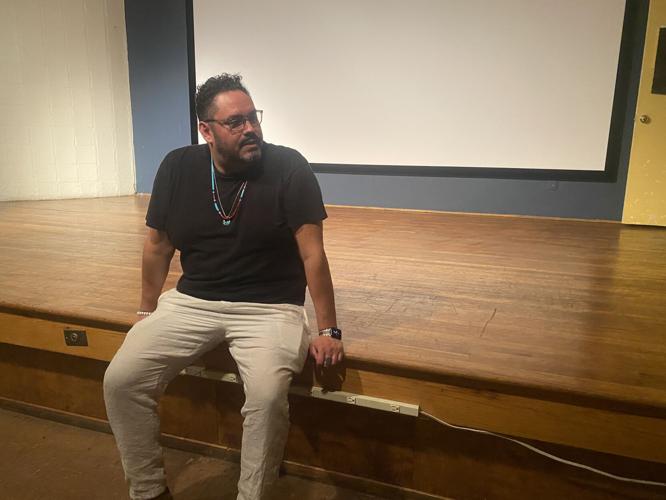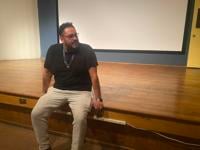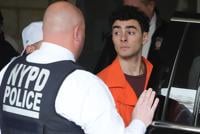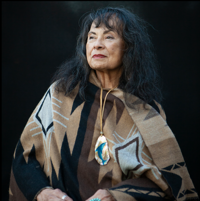
Gregorio Davila talking to the audience next to Alex Mcdonald before their screening of "The Celluloid Closet” at the Philosophical Research Society Auditorium. (Photo By Erick Cabrera)
On August 14, the Philosophical Research Society (PRS) hosted a screening of 1996’s “The Celluloid Closet” directed by Rob Epstein and Jefferey Friedman. The second part of their tri-monthly event was held in Los Feliz, created and hosted by queer Latino director Gregorio Davila, which intends to show audiences the rich history, culture and artistry of the LGBTQ+ community through screenings, live performances and exhibitions.
Based on the 1981 book by Vito Russo, the groundbreaking documentary made waves by gathering footage from over a hundred films depicting the history of roles gay men and lesbians have had over time in Hollywood.
Tom Hanks, Whoopi Goldberg and Harvey Fierstein are just some actors, writers and commentators who treat audiences to funny and insightful stories in the documentary. Along with highlighting the issues of how cinema viewed sexuality, the film spans from the cruel stereotypes and how the public demonized the queer community during the AIDS outbreak to when filmmakers finally became more accepting of the community in recent years.
Before the screening began, Davila took to the front of the auditorium and asked the audience if anyone had not seen the documentary — the majority raising their hands. Davila revealed to the audience that he also shared a similar experience when he first heard about the film during its initial release in the late ‘90s.
Having just moved up to Seattle from California, Davila found out about the film during a conversation with a guy he met at a park. The next day, he went to the Broadway Cinema, a local theater, and was blown away about the amount of queer history featured, so much that he decided to watch the film two more times that same week.
“I had no idea about any of this, and it made me more comfortable to deal with coming out as a gay person, and then as a queer Latino” said Davila.
This film is what eventually peaked Davila’s interest to start making documentaries himself, his first being called “Bent Fest 2001,” which captures a five-day music festival in Seattle that featured an all queer band line-up such as Gossip, The Butchies, Traci + The Plastics and The Chromatics.
His first feature-length documentary “L.A.: A Queer History” captured the rich history of the LGBTQ+ community in Los Angeles, leading to multiple film festival awards. Davila’s latest feature-length documentary “UNIDAD: Gay & Lesbian Latinos Unidos” tells the story about the first queer Latino organization in the country that formed in Los Angeles in 1981.
Both feature-length documentaries can be found streaming on PBS.
CALÓ News spoke to Davila about how this series came to be and about his documentary work.
Davila recalled PRS reached out last year to ask for permission to screen one of his films, this led to other discussions about doing more screenings of Davila’s other works and other LGBTQ+ content.
He then pitched to PRS about doing an ongoing LGBTQ+ series that would occur every two to three months, “My idea was to not only screen films, but maybe have performances, maybe gay queer comics, you know, anything that's sort of, encompasses what the queer diaspora is,” said Davila.
Part of PRS’s initiative was bringing on Davila for this on-going series as part of an effort in having queer content on their calendar year-round. His work highlighting Los Angeles’s queer history was something important to PRS. This falls in line with Manly Palmer Hall’s ideals of knowledge that should not be gatekept. He founded PRS in 1934.

Gregorio Davila after the screening of "Celluloid Closet." (Photo By Erick Cabrera)
“There's a certain tokenism thing where you're just like, ‘Oh, just program something in Pride and then let's move on.’ And we obviously don't want that. (PRS) tries to be very conscious of having queer content on our calendar,” said Alex McDonald, a programmer at PRS.
Their kick-off event took place back in May with a screening of Jenny Livingston’s “PARIS IS BURNING,” a documentary based on New York City’s African American and Latinx Harlem drag ball scene during the 1980s. The series also hosted an after-party in the PRS courtyard, along with vendors from Queer Mercado, the first permanent Queer family marketplace in East Los Angeles.
Outside of this series, McDonald told CALÓ News that PRS is trying to build a community and stressed the importance of creating a home that screens queer content regularly, with the goal of having a safe space for audiences to be exposed to these films that they might not otherwise regularly.
Coming up next in the“Queer Diaspora” series will be a screening “Scream, Queen! My Nightmare on Elm Street” based on actor Mark Patton’s experience of starring in “A Nightmare on Elm Street 2: Freddy’s Revenge” while being a closeted gay man. The two-day event takes place in October with more details to come, according to McDonald.
To get more information about future events, audiences can go to the official PRS website.













(0) comments
Welcome to the discussion.
Log In
Keep it Clean. Please avoid obscene, vulgar, lewd, racist or sexually-oriented language.
PLEASE TURN OFF YOUR CAPS LOCK.
Don't Threaten. Threats of harming another person will not be tolerated.
Be Truthful. Don't knowingly lie about anyone or anything.
Be Nice. No racism, sexism or any sort of -ism that is degrading to another person.
Be Proactive. Use the 'Report' link on each comment to let us know of abusive posts.
Share with Us. We'd love to hear eyewitness accounts, the history behind an article.